climatechange
Latest
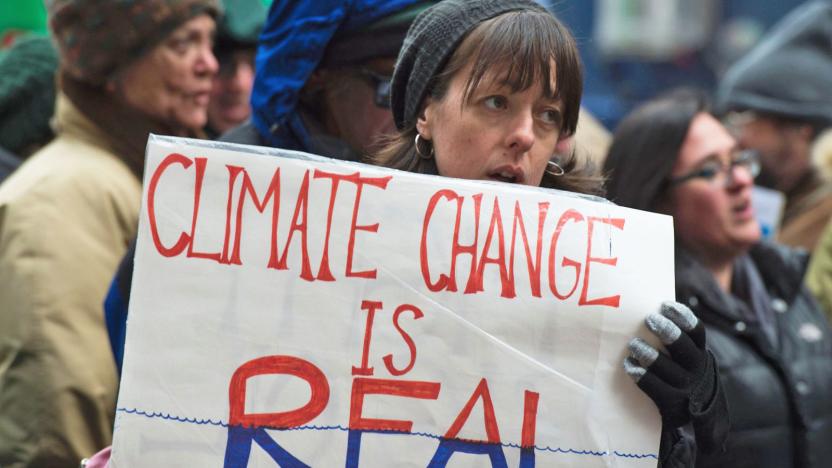
March for Science set for April 22nd
That hoped-for protest against President Trump's anti-science policies? It's on. The newly-named March for Science is now slated to take place on April 22nd -- appropriately, Earth Day -- in both Washington, DC and satellite protests worldwide. The demonstrations will primarily voice opposition to gag orders, funding freezes and other White House attempts to censor climate change science, but it also represents a broader call for politicians to make decisions based on evidence, rather than ideology or corporate agendas.

GM and Honda will mass-produce hydrogen fuel cells together
Just weeks after the car and energy industries began their big push on hydrogen, the first real action is being taken. General Motors and Honda have leapt into bed together to begin work on a new factory that'll mass-produce hydrogen fuel cells for their vehicles. Fuel Cell System Manufacturing (FCSM) will be based at GM's electric vehicle battery site in Brownstown, MI (pictured), and is expected to start work in 2020.

Ireland votes to stop investing public money in fossil fuels
Ireland just took a big step toward cutting coal and oil out of the picture. Its Parliament has passed a bill that stops the country from investing in fossil fuels as part of an €8 billion ($8.6 billion) government fund. The measure still has to clear a review before it becomes law, but it would make Ireland the first nation to completely eliminate public funding for fossil fuel sources. Even countries that have committed to ditching non-renewable energy, like Iceland, can't quite make that claim. The closest is Norway, which ditched some of its investments back in 2015.
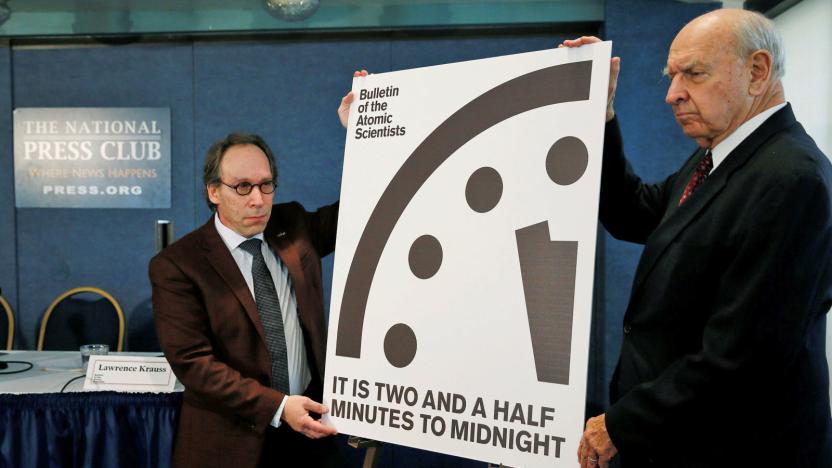
The Doomsday Clock is the closest to midnight since 1953
The Bulletin of the Atomic Scientists just pushed the Doomsday Clock to two and half minutes to midnight, marking the closest point humanity has been to extinction since the first hydrogen bomb test in 1953. Given this latest warning, it's a good time to recall the symbolic clock's history, from its 1947 creation by Manhattan Project scientists to the present. Nowadays, it takes into account not just nuclear dangers but climate change, geopolitics and other factors. With Donald Trump in power, the groups says, all of those areas are more at risk.

Trump's first week: An affront to the web and science
For those who opposed Donald Trump's ascension to the White House, the first week of his presidency confirmed a number of fears. Many of Trump's perceived worst characteristics were on full display. He openly lied about crowd sizes at his inauguration, made his baseless accusations of mass voter fraud a matter of federal investigation and laced his inauguration speech with nationalist overtones. Work began on two of the big initiatives Trump focused on in his campaign: dismantling the Affordable Care Act and building a wall on the Mexico border. The week also featured major moves relating to issues that we focus on here at Engadget: The new administration's disregard of climate change and the environment was on full display, and a major foe of net neutrality is now leading the FCC.

The Engadget Podcast Ep 26: The Sounds of Science
Managing editor Dana Wollman and senior editor Nathan Ingraham join host Terrence O'Brien on the latest episode. First Dana and Nathan face off in the latest installment of Flame Wars, tackling the latest news around Google Voice, struggling streaming service Tidal and the Note 7. Then all three will try to unravel the first week of Donald Trump's presidency and what it means for science in particular.
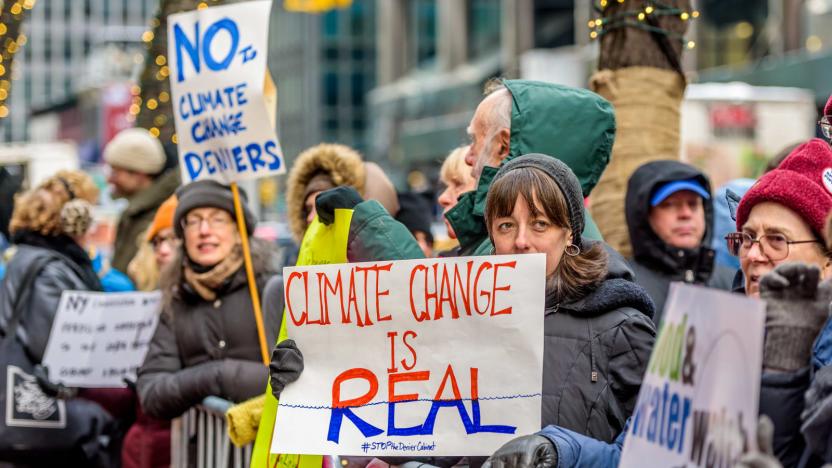
Scientists prepare their own march against Trump
The Women's March on Washington might not be the only big protest against Donald Trump's policies in the near future. Coordination is underway for a Scientists' March on Washington that, as the name implies, would rally support from anyone who believes that scientific facts should play a role in government policy, regardless of their political leanings. Don't like that Trump wants to censor climate change data or otherwise attempt to prevent scientific knowledge from reaching the public? This might be your chance to make your voice heard.

Reuters: Trump admin telling EPA to pull climate change info (updated)
Despite a gag order, Environmental Protection Agency employees are talking to Reuters, informing the outlet that their bosses have been instructed to remove this page from its website (Archive.org). On the official White House website, a page devoted to climate change is now only accessible in its archives, and the EPA section could meet a similar fate. Currently, the webpage displays the effects scientists have already recorded (like 2016 being the hottest year on record), and government initiatives trying to combat the issue.
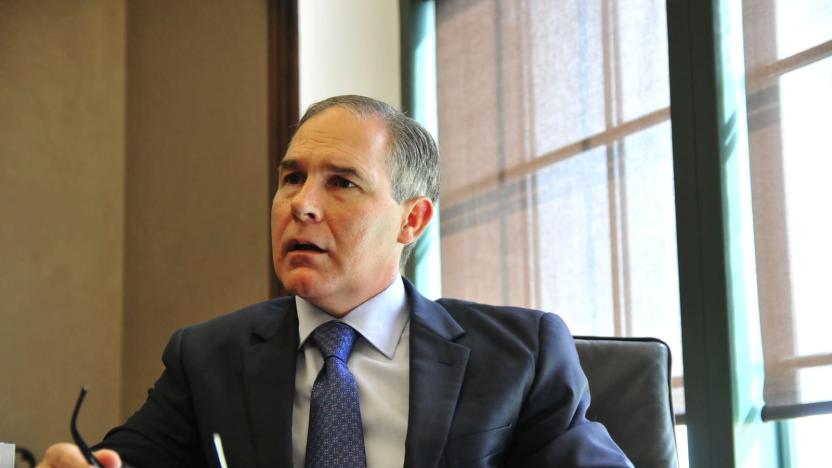
Trump administration freezes grants and contracts at the EPA (updated)
Donald Trump's administration has frozen all grants and contract operations at the Environmental Protection Agency, ProPublica reports. The freeze could disrupt critical, ongoing projects such as toxic cleanups and water quality testing, and it may impact the EPA's budget allocations. The EPA currently has $6.4 billion worth of federal contracts, which it uses to organize clean-up and testing services across the country. It's unclear how long the freeze will be in place or whether it will impact only new grants.
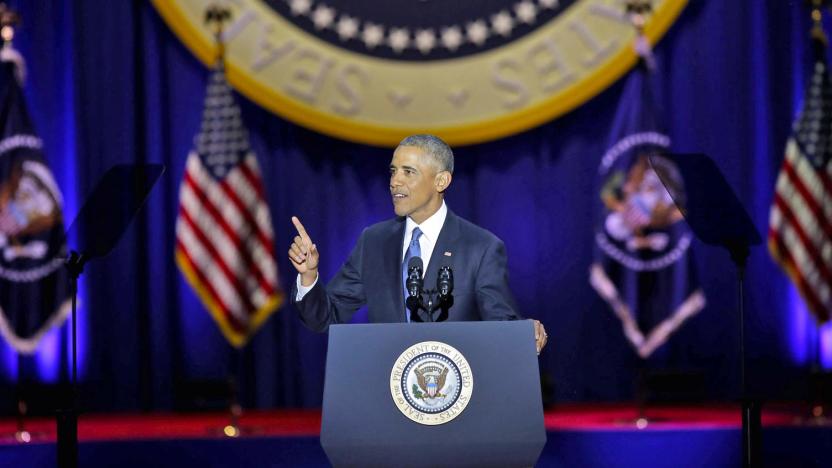
Obama's legacy: The most tech-savvy president
When Barack Obama moved into the White House on January 20th, 2009, the federal government was in the digital dark ages. Even as late as 2011, he was complaining that the White House was 30 years behind. Among other things, Obama was the first president to carry a BlackBerry, and even so, it wasn't until 2016 that the leader of the free world was finally able to trade in his aging RIM device for a modern smartphone. And, as the president was quick to point out in an interview with Jimmy Fallon, the unnamed phone is so locked down, it's like one of those "play phones" you'd give to a 3-year-old. Despite these hurdles, Obama made it one of his priorities to modernize the federal government on everything from telecommunications policy to White House IT. He tackled infrastructure, STEM education, net neutrality and climate change in serious and substantive ways. Of course, the president's efforts weren't always a rousing success, and on issues involving privacy, spying and drone usage, he faces lingering criticism from both ends of the political spectrum. But, love him or hate him, for better or worse, when it comes to science and technology, Barack Obama has had a bigger impact than almost any president in history.

Trump's White House website deletes climate change, LGBT pages
As Donald Trump takes over the White House today, a number of folks on Twitter have been pointing out that many crucial pages on WhiteHouse.gov have disappeared, including those relating to climate change and the LGBTQ community. While certainly troubling to the many millions of Americans worried about how the incoming administration will handle such topics, what's happening on the White House website is little more than a transition -- every page that was up on the site under the Obama administration has been removed, not just ones relating to topics that the new president doesn't care about.
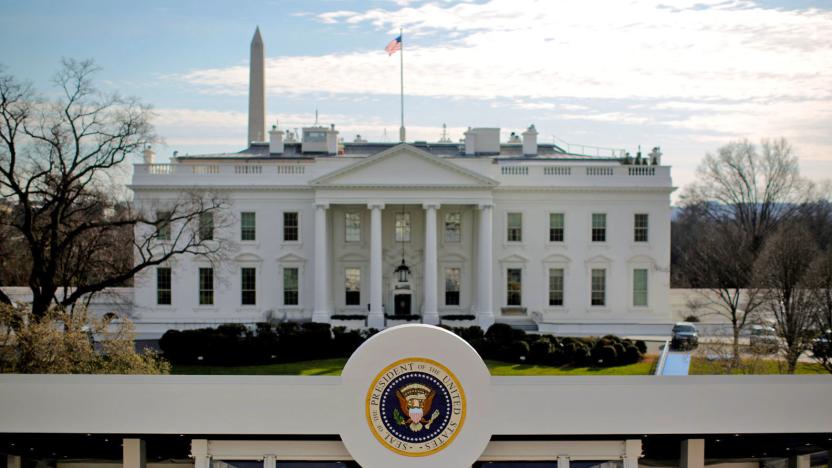
Trump's plan for energy independence sacrifices the environment
Shortly after Donald Trump was sworn into office, the White House's website changed. Beyond the splash image of him and Vice President Mike Pence, under the "issues" tab the President outlines what he plans to do next: eliminate the Climate Action Plan and Waters of the U.S. rule. These "burdensome regulations on our energy industry" have been keeping American workers down for too long, and by nixing them wages will increase by $30 billion over the next seven years. Somehow. And almost assuredly at the expense of the environment.
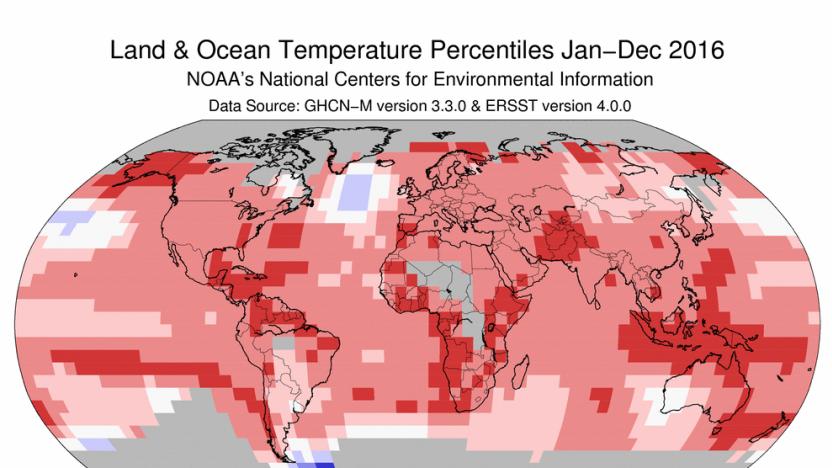
2016 was the hottest year on record (again)
According to a joint report from NASA and the National Oceanic and Atmospheric Administration, 2016 was officially the hottest year on record. If that statistic sounds familiar, it's because 2015 was also the hottest year on record. As was 2014 before that. And those three years of rising temperatures mean the planet is about two degrees Fahrenheit (1.1 degrees Celsius) warmer than it was in the late 19th century.

ICYMI: SpaceX redeems itself with a showstopper rocket launch
try{document.getElementById("aol-cms-player-1").style.display="none";}catch(e){}Today on In Case You Missed It: SpaceX is back in launching mode after the FAA grounded the company following an unfortunate explosion last September. The rocket company successfully launched satellites from its revamped Falcon9, then the motor completed its landing on a SpaceX floating pad.
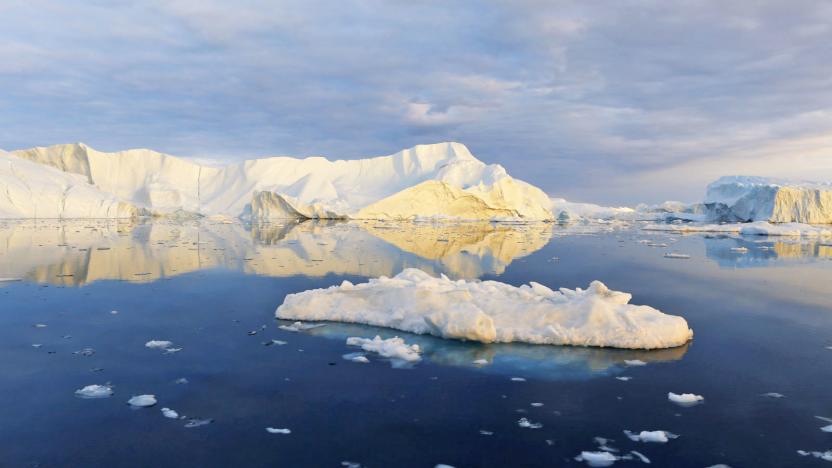
Exxon must turn over decades of climate change research
A court in Massachusetts has ruled that Exxon Mobil must reveal how much it knew about our looming environmental apocalypse. The oil giant is under investigation by the state's attorney general, Maura Healey, who is looking at claims that the company mislead investors about climate change. The court has compelled the company to hand over decades' worth of paperwork relating to what Exxon chiefs knew, and when.

New DoE guidelines stand for scientific integrity over politics
At a time when scientific facts are frequently disputed for political reasons, the Department of Energy is updating its policy to ensure the "protection of scientific integrity." That quote comes from a Medium post by US Secretary of Energy Ernest Moniz that lays out why we need accurate, unbiased science and three points for the department's policy going forward: Energy Department scientists are able to express their opinions. Energy Department scientists must get the opportunity to review Department statements about their work. Energy Department officials should not and will not ask scientists to tailor their work to particular conclusions.

Obama talks social media and climate change in final address
During his farewell address President Obama tackled many different issues, from the importance of our democratic institutions and the lingering effects of racism. But he also took a few moments to briefly address the economic, environmental and technical challenges facing Americans of all stripes.

Climate change could bleach most coral reefs within the century
The Great Barrier Reef's massive loss to coral bleaching last year might have been just a taste of things to come. According to a study by a team of marine scientists, 99 percent of the world's coral reefs could undergo severe coral bleaching before the century ends. The culprit? Climate change. When sea water in a certain location turns warmer than usual, corals in that area expel the algae living in their tissues, effectively turning them white. That's what bleaching is. It doesn't instantly kill the corals, but it makes them much more vulnerable to fatal diseases.

Astronaut and climate scientist Piers Sellers dies at 61
It's sad when humanity loses pioneering astronauts who claim important firsts, but it's equally tragic when we lose those astronauts who quietly accomplished a lot both in orbit and on the ground. And unfortunately, we just lost one: Piers Sellers, a NASA astronaut and climate scientist, has died of pancreatic cancer at the age of 61. You may not have heard of him, but the UK-born explorer was a major force in NASA for decades.
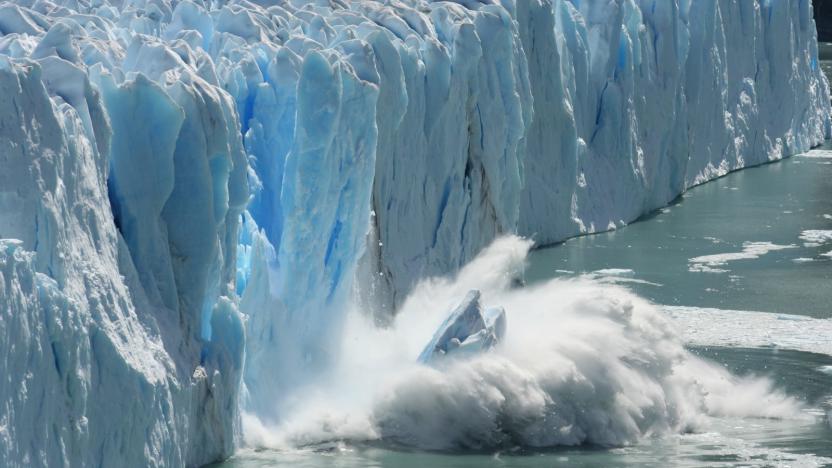
Prepare for even more volatile weather in 2017
Ice isn't just great for keeping your drinks cool at parties, it also helps keep our planet cool by reflecting some of the sun's heat away. But thanks to our glacially slow progress in addressing climate change, there's going to be a lot less ice in the Arctic next year. Scientists are observing record high temperatures in the Arctic circle that's likely to lead to record low levels of ice coverage in 2017. Long story short, we're currently melting the wall that's helped stop the seas boiling for all of these years.









